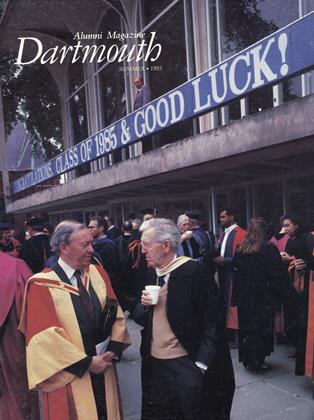by David Butler '63 Simon and Schuster,1985. $17.95.
The head of the United States Information Service in Vietnam appeared on South Vietnamese television the evening of April 17, 1975, to say that the Americans were not leaving Saigon. This was, he told David Butler, part of his belief in "disinformation in a just cause." Saigon was evacuated twelve days later.
The narrative of the final two months of U.S. involvement in Vietnam is a brilliant historical tapestry interweaving personal narratives and official documents. Butler was there, on the final day, as a correspondent for NBC radio news, and is therefore able to pull together the complexities of the U:S. evacuation with a clarity and vividness that makes the event of ten years ago appear to have happened yesterday.
There is a cast of thousands. The employees in the U.S. Embassy, packing up a few belongings and destroying the paper trail of the war involvement; the Marine guards, struggling to keep Vietnamese civilians from climbing over the wall into the compound; the officials, who kept reassuring the Vietnamese employees they too would be evacuated until the last helicopter lifted off and left them behind; and the foreign correspondents, busy taking final notes and photos of the melee around them.
Shadowy eminences keep sending cables to the U.S. Embassy from Washington. As the U.S. Ambassador to Vietnam, Graham Martin, says, many of the cables are part of the continuing "cover your ass" operation by U.S. Secretary of State Henry Kissinger, and his top advisers on national security like Brent Scowcroft, to disguise the fact of U.S. humiliation and defeat. These CYA and "disinformation in a just cause" operations became standard operating procedure during the final two months. On April 17, the same day the U.S. chief was lying to TV viewers, Kissinger sent Ambassador Martin a cable that said what the Embassy should do: "We have just completed an interagency review of the state of play in Vietnam. You should know that at the WSAG (Washington Special Action Group) meeting today there was almost no support for the evacuation of Vietnamese, and for the use of American force to help protect any evacuation. The sentiment of our military, DOC (civilian leadership of the Department of Defense) and CIA colleagues was to get out fast and now."
The incredible speed of the final collapse astonished everyone. The evacuation of Da Nang on March 29, where people killed each other to clamber aboard the few planes and boats available, set up a grim preview of what would happen to Saigon. Successive pullouts of Cam Ranh, Phan Rang, and other bases on the coast led the enemy inexorably to Saigon and the ultimate victory.
David Butler ponders his own deci- sion as a correspondent to be evacuated rather than stay in Saigon, as some cor- respondents did, to cover the surrender. "I knew," says Butler, "that for the rest of my life I would calculate the propor- tions of reason and cowardice in my behavior on the morning of April 29, 1975. At the moment [when Butler was on board the U.S.S. Okinawa with the rest of the evacuees] I was pegging cowardice at approximately seventy-five percent. Above all, I was suffused with a dry, suffocating humiliation." His answer, ten years later, is a masterful book, a triumph of reason, which any correspondent would be proud of.
[David Bowman has been a Costa Rican correspondent for United Press Internationaland the Memphis Press-Scimitar, and editorial writer for The News, Mexico City'sEnglish-language daily.]
 View Full Issue
View Full Issue
More From This Issue
-
 Feature
FeatureA Humanist Ponders the Future of Liberal Education
June 1985 By Charles T. Wood -
 Feature
FeatureAn Apple on Every Desk
June 1985 By Fred Pfaff '85 -
 Feature
FeatureThe Great Train Robbery
June 1985 By Fred Pfaff '85 -
 Feature
FeatureThe Wentworth Bowl
June 1985 By Barbara J. MacAdam, Curator, Hood Museum of Art -
 Cover Story
Cover StoryValedictory Address
June 1985 -
 Feature
FeatureReunions 1985
June 1985 By Robert Frost
David Bowman '63
Books
-
 Books
BooksShelflife
July/Aug 2013 -
 Books
BooksLABOR PROBLEMS FROM BOTH SIDES,
June 1938 By Harold G. Rugg '06. -
 Books
BooksTHE AUTOBIOGRAPHY OF EDWARD GIBBON.
July 1961 By HAROLD L. BOND '42 -
 Books
BooksA Cry Out of the Dark
February 1921 By Kenneth Allan Robinson -
 Books
BooksA TEXTBOOK of BACTERIOLOGY and its APPLICATIONS.
MARCH 1929 By Kenneth N. Atkins -
 Books
BooksPANORAMA DE LA CIVILIZACION ESPANOLA.
JUNE 1963 By ROBERT H. RUSSELL





